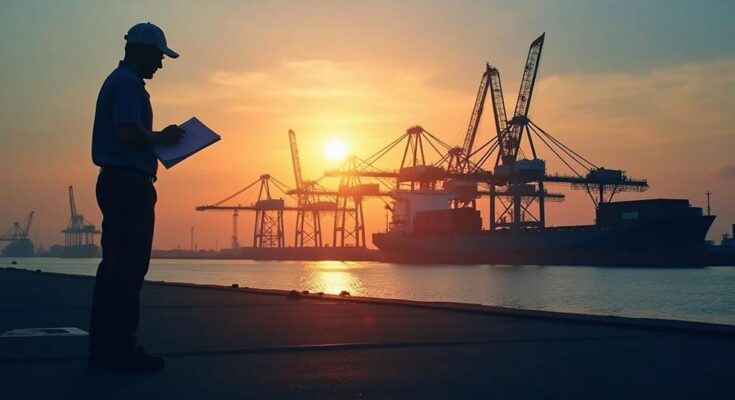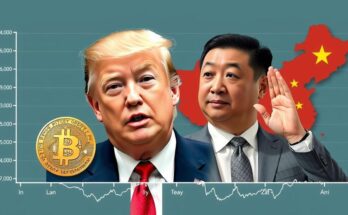A potential strike by maritime workers looms, scheduled for October 1, and could significantly disrupt U.S. supply chains, affecting essential goods and leading to increased prices. This comes at a critical time for upcoming elections, posing challenges for President Biden and Vice President Harris amid concerns over economic stability and consumer prices. Experts warn of severe consequences should the strike prolong, amid existing vulnerabilities in the U.S. supply chain.
A potential nationwide strike by maritime workers looms, marking the first such strike in almost 50 years, and is set to occur at a particularly critical time for the U.S. economy and upcoming elections. The strike, scheduled for October 1, implicates tens of thousands of longshoremen at East and Gulf Coast ports, which are crucial for handling more than half of the United States’ container imports, including essential items such as auto parts, electronics, food, and furniture. At the core of the dispute between the International Longshoremen’s Association (ILA) and the U.S. Maritime Alliance (USMX) lies the demand for stronger protections against automation and improved wages. Experts suggest that even if the strike lasts only a few days, it could have significant repercussions for Vice President Kamala Harris’s campaign against former President Donald Trump. The timing of the strike further complicates matters for President Joe Biden, who has publicly advocated for labor rights during an election season where economic stability is paramount. While a swift resolution could minimize the economic fallout, prolonged labor unrest could exacerbate supply chain disruptions, leading to shortages and increased prices in key sectors. According to supply chain authority Peter S. Goodman, “If this is settled in a couple of days, the impact will be minimal. But if it drags on for weeks, then you have a potentially very significant problem.” The impending strike underscores vulnerabilities in the U.S. supply chain, which has already faced challenges stemming from the COVID-19 pandemic and various geopolitical factors. Murky forecasts predict that goods such as furniture—already sensitive to shipping delays—will experience heightened costs. Ryan Petersen, CEO of Flexport, noted, “Big, bulky items like furniture are hit harder because fewer items fit in a container, driving up the per-item cost.” Furthermore, fresh produce, particularly bananas sourced from Central and South America, will likely face immediate risks from shipping disruptions. Retailers, aware of the potential fallout, have reportedly taken preemptive measures by enhancing their inventories in anticipation of the strike. Jonathan Gold from the National Retail Federation described several initiatives to mitigate the impacts of a potential strike on supply chains, although he conceded that even minor disruptions could yield negative impacts leading up to the holiday shopping season. The looming strike also presents a political quandary for President Biden. While he could deploy the Taft-Hartley Act to impose an 80-day cooling-off period to avert the strike, such intervention may alienate labor unions—an essential segment of his political base. Goodman expounded on the political stakes, stating, “Biden has positioned himself as friendly to labor, and using powers like the Taft-Hartley Act to end the strike could anger organized labor.” Meanwhile, as inflation remains a concern for voters, a prolonged strike could aggravate price increases ahead of the elections.
The impending strike by members of the International Longshoremen’s Association represents a significant labor action in the U.S. maritime sector, occurring just weeks before pivotal elections. This strike threatens to disrupt supply chains that not only affect a variety of sectors but also have direct implications for the cost of living and economic stability—a primary concern for voters. The maritime labor dispute underlines long-standing issues inherent in modernization and labor rights, with ramifications that extend beyond economic statistics, posing challenges for political incumbents and candidates as they navigate the complexities of public sentiment surrounding inflation and the economy.
In summary, the potential maritime workers’ strike poses significant threats to the U.S. supply chain just before critical elections, with serious implications for economic stability and consumer prices. Political leaders, particularly President Biden and Vice President Harris, find themselves at a crossroads, balancing labor relations with public economic concerns. The situation demands close monitoring as voters prepare to head to the polls amidst these unfolding labor tensions, which could very well influence electoral outcomes.
Original Source: www.newsweek.com




